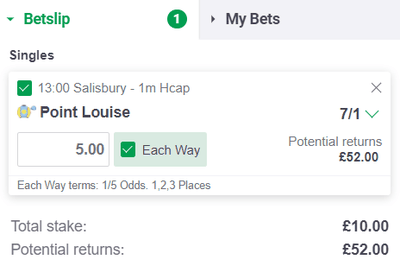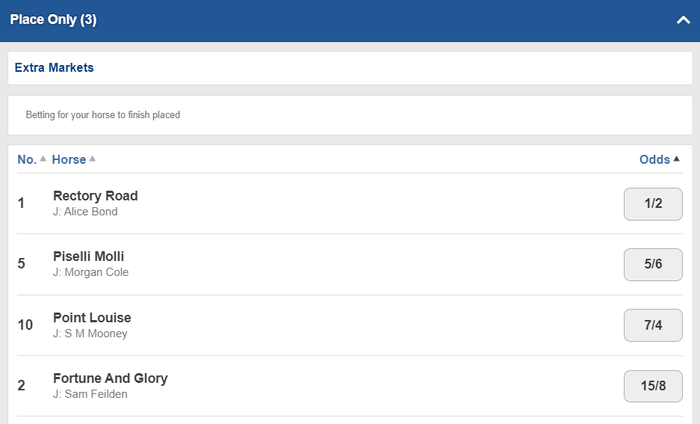 Most of the time when betting, our aim is to correctly predict the winner of a selected race or match. Should they win, we win too but if they lose then that’s our bet down the drain. There are however two alternatives to this in which you can still win money even if your chosen selection fails to win, but manages to finish quite high up the order. One is known as an ‘each way’ bet (often written e/w) and the other is known as a ‘place’ bet.
Most of the time when betting, our aim is to correctly predict the winner of a selected race or match. Should they win, we win too but if they lose then that’s our bet down the drain. There are however two alternatives to this in which you can still win money even if your chosen selection fails to win, but manages to finish quite high up the order. One is known as an ‘each way’ bet (often written e/w) and the other is known as a ‘place’ bet.
While they do have their similarities, each way betting and place betting are not synonymous terms and major differences exist. As a result, there are times where you will want to choose one over the other, and vice versa. If you tend to pick the right option more often than not, you will discover that both each way and place betting can be useful tools in your betting arsenal.
What is Each Way Betting?
 Although each way betting is available across a number of different sports, it is horse racing that attracts the majority of each way bets. As such, we will use a randomly selected horse race a little later on to provide you with an example of what each way betting is.
Although each way betting is available across a number of different sports, it is horse racing that attracts the majority of each way bets. As such, we will use a randomly selected horse race a little later on to provide you with an example of what each way betting is.
Before this though let us explain exactly what an each way bet entails. Put as simply as possible, an each way bet consists of two separate parts, one goes on your selection to win and the other on your selection to place. As you are making effectively two bets, whatever you enter as your stake for the wager will be doubled. So a £2 each way bet would cost you a total of £4.
Now, at this point, you are probably asking what it means to ‘place’. We all know what it means to win but ‘place’ is a much more ambiguous word. Basically for someone or something to place, it must finish within the top few places of the race or competition. The exact number will be determined by the individual bookmaker and made clear when placing your bet. It is something that varies across sporting events so it’s important you don’t think it is always the top two finishers, for instance.
For horse racing, there are standard placing terms for each way bets as provided in the table below. For a well-attended 15+ runner handicap, a horse would need to finish within the top four to successfully place. In a contest with five to seven runners though, only a top-two finish is sufficient.
| Number of Runners | Places | Odds |
|---|---|---|
| Handicaps of more than 15 runners | 4 | 1/4 |
| Handicaps of 12-15 runners | 3 | 1/4 |
| All other races of more than 7 runners | 3 | 1/5 |
| All races of 5-7 runners | 2 | 1/4 |
| All races of less than 5 runners | Win Only | – |
Just bear in mind that these are typical terms but bookmakers are not bound by them. You will find that it is not particularly uncommon for bookies to offer enhanced each way terms, perhaps paying out on even five or six places for popular races. Alternatively, they might keep the number of places the same but reduce the fraction of the odds.
Speaking of these odds fractions, why have these appeared? Well, this is because unlike the win half of your each way bet, the place part is only paid out at a fraction of the full price.
Example
So, let us say we stake £5 each way on Point Louise in the 13:00 at Salisbury. If she wins the race, both parts of each way bet will return us money as he has both won and placed (in this instance, finished inside the top three). Our total return would therefore be £52, with a full breakdown provided below:
- Win – £5 at 7/1 = £35 win plus the £5 stake returned
- Place – £5 at 7/5 (1/5 odds) = £7 win plus the £5 stake returned
If Point Louise finished second or third however, we would only receive the ‘place’ money and we would lose the stake from the win half of our bet. In this case, the end result would be that you won £2 (£12 returned).
What is Place Only Betting?

Now you are fully up to speed with what an each way bet is, we can highlight how a place bet differs. One major difference is that whereas each way flutters effectively involve two separate bets (to win AND to place) a place bet is just a single bet. It is therefore not possible to lose half your stake as you will either receive it all back (if placing a successful place bet) or you will lose it all.
Another difference is the odds you will receive. In the place betting market, all contenders will have a much lower price than they do compared with the ‘to win’ market. This makes sense of course as now they do not need to win, only finish in the top 2/3/4 places, for your bet to be a success. Instead, the prices available will be similar to what they are for each way betting, only a little shorter usually. In our example above, we would receive 7/5 for Point Louise to place when betting each way but she was 7/4 when simply backed to place. In the same race, a horse by the name of Sunset Memory was available at 10/1 to win, so 2/1 to place with an each way bet but a slightly longer 5/2 for a top-three finish.
Place betting can easily work out better value for money though as you will not lose half your stake. As we explained before, if Point Louise finished second or third we would only win £2 from our £5 each way bet (£10 total stake). If we instead put the £10 on the same horse to place at 7/4 however, we would win £17.50.
The last difference to be mindful of with a place bet is that you receive the same money back regardless of how the horse performs. Your returns are fixed no matter if your selection finishes first or squeezes into the final place position. This is a major difference to each way betting in which the returns are always much larger should your selection win, rather than just place.
Which is Best, Each Way Betting or Place Betting?

There is no definitive answer to this but there are times where we would certainly recommend one bet type over the other. Each way bets should generally be preferred in cases where you think your selection has a good shot at winning the contest. This is because only with an each way bet will you be generously rewarded should your selection end up victorious. Should they fall just short, you will receive something of a small consolation, which in most instances should ensure you walk away with at least something.
The other main option for an each way bet is where you simply want to eye up a big prize. You might think your selection does not have that much hope but you want to watch a race or match with the excitement that could get a lot back even if they only manage a place finish. It is not that especially rare for instance to see 50/1+ shots in the Grand National managing a place finish.
Place bets on the other hand are best when you think one contender is definitely capable of finishing high up the pecking order, but a win is perhaps asking a bit too much. This can often be the case when a race consists of one or two strong favourites. It is one way of taking advantage of outside options you think are undervalued in the market. An underrated 16/1 option will probably not win but to finish in the top three? That might be an extremely achievable result.
The bottom line is, if the selections you make on an each way bet only ever seem to place and rarely seem to win, place betting is the way to go. Although each way place odds narrowly beat standard ‘to place’ odds, you do not have the big disadvantage of losing half your stake. A £10 to place bet, will return considerably more than opting for £5 each way on a horse that places but does not win. Conversely though, if you find that a lot of your place selection end up finishing first, you are simply not maximising your special talent for picking winners! If this is the case you need to start backing them each way or even just with a straightforward win bet.
